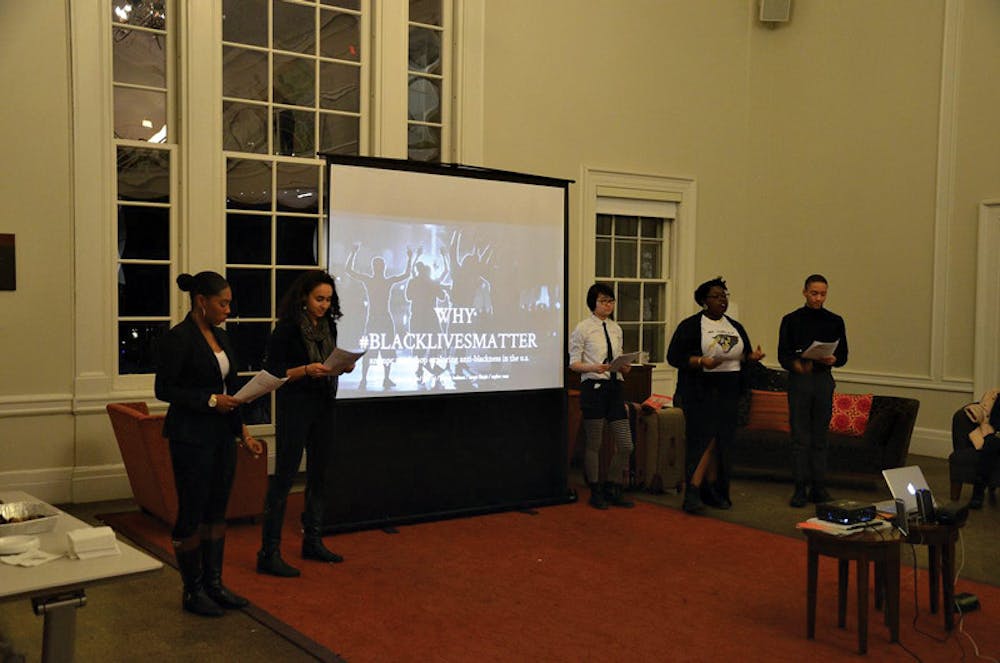This post was updated February 11, 2015 at 3:42 p.m.
Anti-black racism is “harder to see, harder for people to understand, because it’s not written in law,” said Jacinta Lomba ’17, Minority Peer Counselor, at an MPC worshop Tuesday, entitled “Why #BlackLivesMatter: an MPC Workshop Exploring Anti-Blackness in the United States.”
The hashtag started trending in response to the fatal shooting of black teenager Trayvon Martin by white neighborhood watchman George Zimmerman in Florida last year. Its creators — Alicia Garza, Patrisse Cullors and Opal Tometi — wanted the online tool to serve as a “call to action” by highlighting acts of racism in the country.
The workshop, which took place in a packed Leung Family Gallery, explored several “racialized forms of social control,” including slavery, Jim Crow, the War on Drugs, the School-to-Prison Pipeline and stop-and-frisk policies, said Lomba, one of the event’s organizers.
Lomba and MPCs Jieyi Cai ’17, Jovaun Holmes ’17, Maya Finoh ’17 and Taylor Ross ’17, created and presented the workshop.
During the workshop, the organizers encouraged attendees to reflect on their view of the hashtag #BlackLivesMatter and the place of that view within the larger Brown community. They also stressed the importance of placing recent events such as the killings of Michael Brown and Trayvon Martin in a broader context of the history of racism.
“It’s very easy today to say that we live in a post-racial society, (that) ‘we have a black president, therefore these murders do not have anything to do with race,’” Cai said. “We’re trying to show that it has everything to do with race.”
The workshop contextualized the #BlackLivesMatter movement not only within history, but also within the politics of gender and sexuality. The team asked attendees if they believed that certain voices are often overshadowed within the movement, citing examples of violence against black women and black LGBT individuals.
The five MPCs wanted to remind attendees that “everyone has a stake in” anti-black racism, Finoh said.
Lomba echoed this sentiment, noting that “Anti-black racism is the foundation of racism in the United States. Blackness is, at its core, what racism works against. All other racial groups are connected to it in that way.”
Cai said, “I’m not a black person, I have light skin privilege. … We can fight for the liberation of all beginning with this most fundamental acknowledgement, that anti-black racism is so deeply ingrained in American society.”
Ross said she views events like the workshop as starting points for open dialogues on race, adding that universities should work to ensure that a diverse range of student experiences are heard and understood. With this in mind, the organizers made an effort to include much dialogue amongst attendees. The event featured opportunities for students to speak to those next to them, partake in large group discussions and listen to shared experiences from attendees who identify as black.
The workshop was proposed in the spring, when all MPCs submit ideas for workshops and five proposals are selected, Lomba said. The MPCs began preparing for the workshop when they returned from winter break, conducting research and holding frequent meetings, she said.
The event resurfaced questions of administrators’ handling of the protest and shutdown of a planned lecture on campus by former New York City Police Department Ray Kelly on campus last spring.
Looking ahead, Finoh said she would like to see “student groups and administration at Brown be more active in … acknowledging that anti-blackness does exist.”
Cai critiqued the administration’s treatment of the protestors, adding that “How the University handled that showed that clearly there were certain priorities that were not in line with student well-being.”
Lomba classified the University’s responsibility regarding racial dialogues as two-fold: interpersonal, with forums and workshops, and structural, in terms of decisions made in department funding and diverse hiring practices.
She noted the recently released list of proposed books for the First Readings Program for the class of 2020 as a significant step forward in racial dialogues on campus. One of the proposed texts is Michelle Alexander’s book “The New Jim Crow: Mass Incarceration in the Age of Colorblindness.” A group of undergraduates pushed to add the book to the University’s list of nominations last semester. The students wrote in a column in Bluestockings Magazine at the time that Alexander’s book is particularly salient given recent events like the Martin and Brown shootings.
It is “exciting to think that this might be the book that kicks off the four years that the incoming class at Brown will have,” Lomba said. “Brown has the power to make that decision. We hope that it does.”

ADVERTISEMENT




